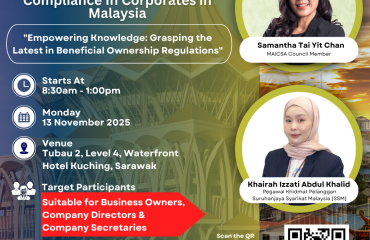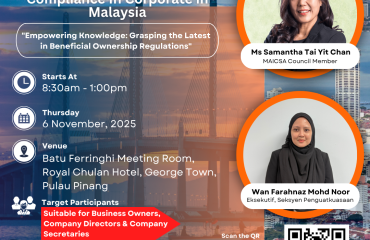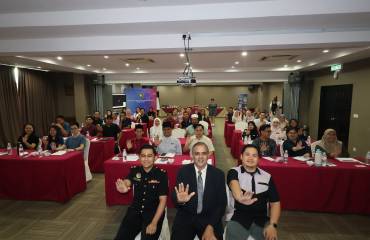Malaysia’s CPI (Corruption Perceptions Index) 2008 Score Shows no Improvement
In the CPI 2008 Malaysia is assessed to have a score of 5.1 the same as the score for 2007. The score for Malaysia for the last eight years since 2001 has straddle between 4.9 (2002) and 5.1 (2005, 2007 & 2008). This shows that the trend of the CPI for Malaysia has remained mediocre at mid point with no real improvement for the last eight years.
However, in terms of country ranking, Malaysia shows a gradual decline from 36 placement (out of 91 countries surveyed) in 2001 to 43 (out of 179 countries) in 2007 and 47 (out of 180 countries) in 2008. This shows that there are a number of countries that have progressed much better than Malaysia. Please refer to Table 1 in below.
In comparison with the ASEAN nations Singapore as expected comes first with a score 9.1 with a wide gap from Malaysia second place(score: 5.1), then Thailand (3.5), Vietnam (2.7) Indonesia (2.6), Philippines (2.3), Cambodia (1.8) and lastly, Myanmar (1.3). The predominantly low CPI indices for most of the ASEAN nations indicate impediments to the realisation of a competitive AEC (ASEAN Economic Community) by 2015.The high degree of corruption that still exists in these economies could impair business efficiency, obstruct or slow down cross border trade and makes doing business more expensive and riskier.
Malaysia Must Walk the Talk!
While fighting corruption in the public sector requires strong political will, this will must be followed by a strong and persistent determination to strengthen oversight and accountability and making transactions and decisions more transparent. A culture of intolerance for corruption needs also to be instilled into the culture of the civil service, the Corporate sector and Political leaders must lead by example and walk the talk.
While Malaysia can be commended for taken significant initiatives, namely; the setting up of PEMUDAH, the joint public-private sector collaboration to improve the government delivery system and services and the implementation of the National Integrity Plan, the perceptions of the degree of corruption remain largely unchanged. This may be due to a number of high profile cases that may have dampened public confidence in the integrity of government institutions, namely;
1. The “ Lingam Gate” which highlighted the lack of independence of the judiciary.
2. A number of high profile alleged corrupted cases in government procurement.
3. Abuses in land excision and fraud on land transfer exposed in Penang and other places.
4. Corruption at local municipality on business transactions
Not included in the above are the daily encounters by the public with officers of enforcement agencies demanding favours or bribe as reflected by the cases of corruption involving the Immigration, Police, Customs and Puspakom agencies.
Undoubtedly, many of these cases may not have been reported in the media if not for the openness of the present government.
It is also commendable for the Prime Minister to initiate reforms in some of the institutions especially the judiciary and the Anti-Corruption Agency to make them more independent, transparent and accountable.
Furthermore, the ratification of the United Nation Convention on Against Corruption (UNCAC) on 17 September 2008 has brought Malaysia to be at par with the international norm for a modern economy.
However, the mediocre CPI score for Malaysia should be a sharp reminder to the Malaysian Government that it needs to go beyond rhetoric and pronouncements and show greater commitment to combat corruption in spite of great resistance by self-serving pressure groups whose main interest is to benefit themselves even at the expense of the civil society and our country. Wastage and leakages through over pricing of procurement or shoddy work and services as often highlight by the Auditor General’s Report must be dealt with expediently and the culprits responsible be prosecuted.
Apart from executing institutional and law reforms, Transparency Malaysia believes that the way forward for country is to seriously combat corruption is
1. To make government decisions and transactions more visible and transparent. This requires the revamping of the Official Secrets Act which, while in some cases may be required for national interest but in others, it just provide a haven for corruption.
2. To make government procurement more open by prohibiting closed and negotiated tenders and implement integrity pact or agreement with vendors as preventive measures to curb corruption and finally,
3. To curb money politics which makes representative standing for election and political parties more restricted and more accountable in the use of money in election.
4. Money politics is the mother of corruption and government must show the political will to nip it in the bud.
5. Government would need to introduce the Freedom of Information Act.









